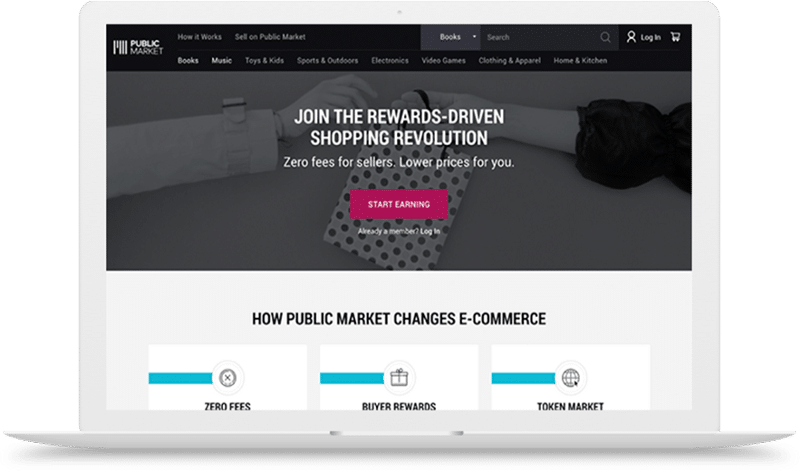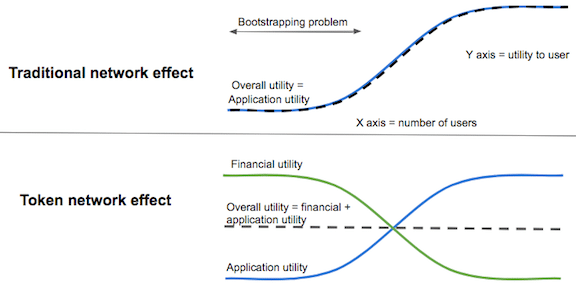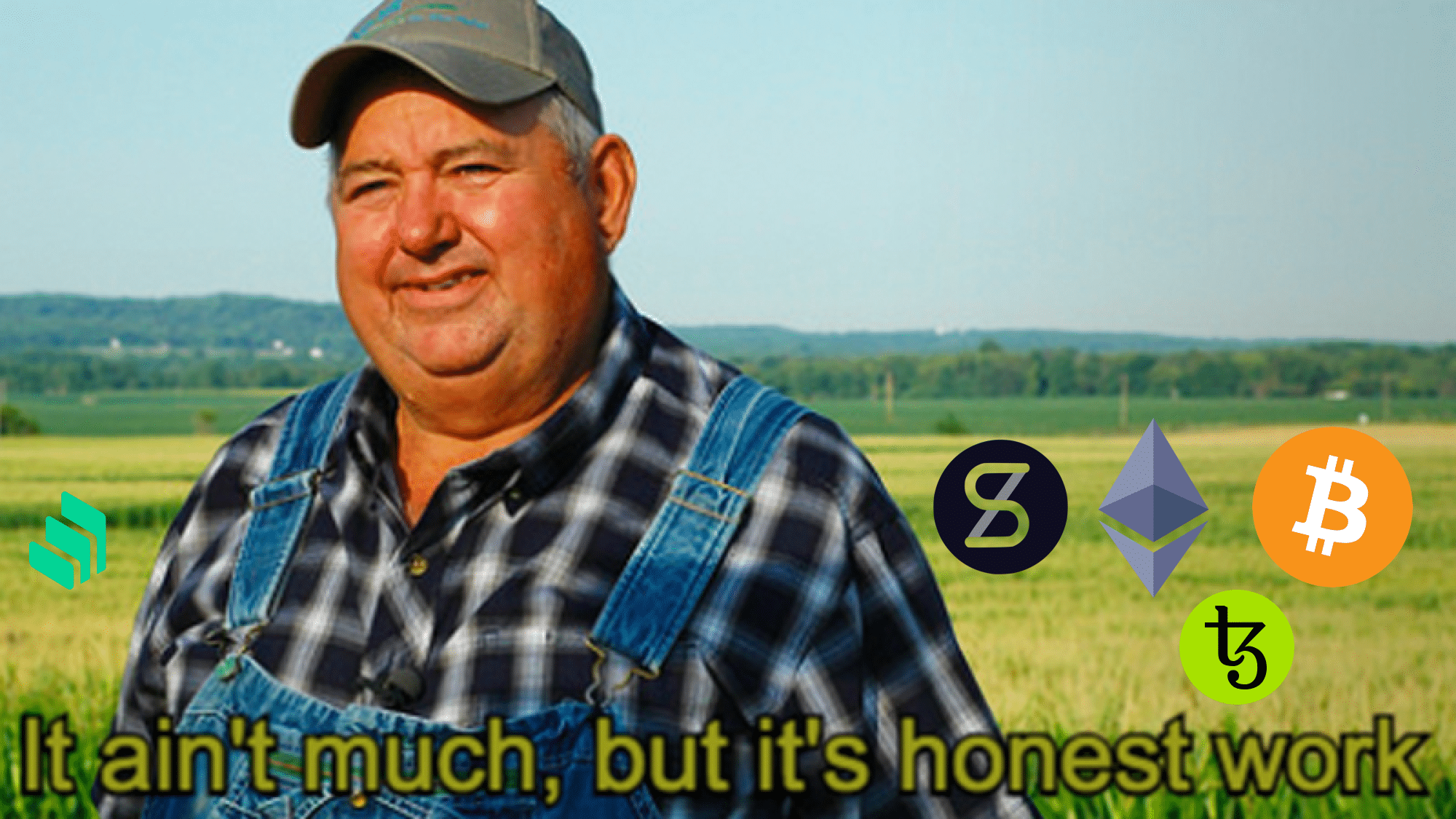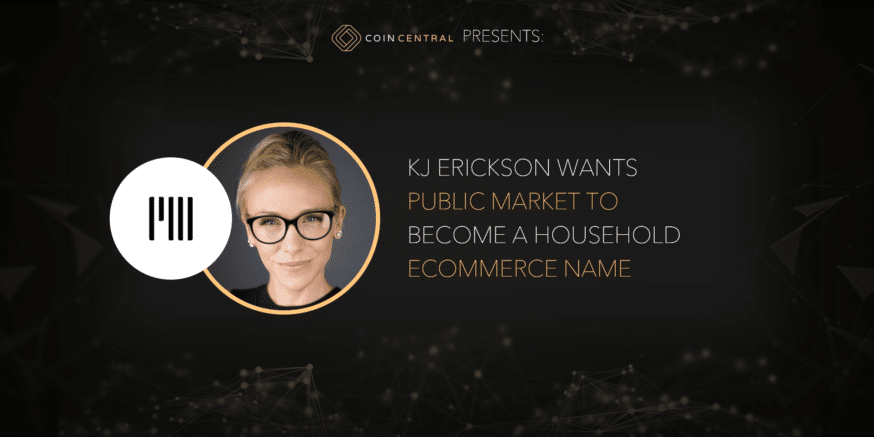KJ Erickson, Public Market Co-Founder and CEO
Public Market is an open data protocol for eCommerce marketplaces. With funding from Coinbase Ventures, Greylock Ventures, and Y Combinator, among others, the team is working to make eCommerce platform middlemen obsolete.
Because of the current online shopping landscape, intermediaries such as Amazon and eBay can get away with charging exorbitant fees and commissions to sellers, which, in turn, affect the prices you see as a consumer. Public Market provides an open architecture using blockchain technology to replace the role of these middlemen at a fraction of the cost.
We sat down with the company’s CEO, KJ Erickson, to learn more about the protocol and her thoughts on blockchain adoption as a whole.
Her resume speaks for itself. She’s an entrepreneur with fourteen years of experience, who’s been named by Rolling Stone as one of the “25 People Shaping the Future” and by the New Leaders Council as one of the “Top 40 Leaders Under 40.” Before working on Public Market, she founded Simbi, the “world’s largest services marketplace run on a digital currency.” Now, the Oxford Business School graduate is using her past experiences to reshape eCommerce.
The Interview
Give us the two-minute movie trailer of your life. How did you end up where you are today?
I’ve been a founder since I was 20 years old when I dropped out of Stanford after founding an NGO working in refugee camps and post-conflict zones in Africa. I cut my entrepreneurial teeth working in some of the most difficult psychological and operational environments on the planet and toughened my skin by scaling my organization to 200 people over the course of a few years. In the process, I lived up close and personal with the impacts of bad economic policies, hyperinflation, and the intimate connection between poverty and war.
As I got older, I got wiser about my work to economically empower people and create more just economic systems. While running an NGO was personally fulfilling, it wasn’t scalable enough. I wanted to do work that could address the true systemic issues at the root of poverty.
Thus, my next venture was to build Simbi, an alternative economic system that runs entirely on its own currency. Simbi helps those who struggle in the dollar-based economy to turn their excess capacity into real economic value. That work is super important, but ultimately is an uphill battle against the incredible economic disempowerment we are seeing in our country due to run away corporatism and monopolistic wage pressure.
Once I got into blockchain, I realized that we may finally have the tools to change the game. If we can rebuild our economic infrastructure in a way that is fair, non-extractive, and price-optimized, there is a fighting chance we can reverse the horrific advancements of wealth inequality and plutocracy that we are currently witnessing worldwide. Ultimately, my background in creating consumer web products, combined with my training in economics and game theory, led me to create Public Market.
Describe Public Market in your own words. What are the attributes that set the platform apart from competitors?
Public Market is a commission-free eCommerce marketplace where buyers can buy the same products from the same sellers that they would otherwise purchase on Amazon or eBay or other private marketplaces. But because we don’t charge commissions, we return those savings to buyers in the form of rewards tokens.
We do this through an open data protocol that pools and makes public the third-party inventory that marketplaces like Amazon keep proprietary.
Our mission at Public Market is to restore the commercial commons. By eliminating the middlemen that sit by the digital register in all of today’s marketplace purchases, we are restoring competition so that goods can be freely and fairly traded for everyone’s benefit. Public Market is the Amazon of the Web3 era.
Your flagship application is launching with millions of products already available. What was your strategy in making that possible?
Public Market aims to be the best and highest-utility consumer product that the blockchain space has yet to see. We knew that to really provide value to buyers, we had to make tons of products available for them to purchase as early as possible. So our team spent the last 18 months building our product and our professional merchant partnership strategy to ensure our users can find the products they already buy on major marketplaces.

By partnering with professional merchants – in some cases the largest third-party merchants that transact on eBay and Amazon – Public Market was able to launch its beta with millions of unique inventory items. Over the next year, our goal is to enable you to come to Public Market instead of Amazon for the majority of your everyday purchases.
In your Medium article, The Future Of Network Effects: Tokenization and the End of Extraction, you explain how tokenizing certain systems could help reduce the negative aspects of network effects. How is Public Market accomplishing this?
Unlike anything we’ve seen before, blockchain allows for businesses that ordinarily suffer from monopolization to be built around tokenized ecosystems in which the interests of the network participants are aligned with the interests of the network builders. When a platform that benefits from network effects is built around a decentralized tokenized network, no private company needs to profit off the users by extracting fees and data.

This is the philosophy on which Public Market is building a commission-free tokenized ecosystem for eCommerce marketplaces. The Public Market business model is built around the Public Market token, PTRN. The token creates strategic network effects that enable commission-free selling, competition at the application layer, and economically incentivized buying. I firmly believe that tokenization represents a revolutionary shift in how networks and businesses can be built.
What do you see as the biggest hurdle to Public Market’s success, as well as, the success of blockchain as a whole?
Everything will come down to mass adoption.
For Public Market, we need to ensure that a) our message reaches buyers, and b) our product and value proposition is sufficiently compelling to buyers. From there, everything else falls into place.
For blockchain as a whole, there is not enough focus on what mass audiences need. The big issues to solve will be usability and user experience. The average person is not going to be willing to use clunky, confusing apps. Until those apps get to experience parity with centralized apps, and until they get the value propositions in place that make decentralized apps significantly better than centralized ones, they are going to have a pretty niche audience.
Other than financial services and marketplaces, where do you see blockchain technology having the most substantial impact?
I believe that blockchain’s greatest impact will be in helping us to escape some of the worst trappings of late-stage capitalism — where economic gains all flow to the top. Blockchain technology can not only help us redistribute ownership, it can also empower communities to write their own rules. Until I really understood these potential implications, I had very little hope for the justice of our economic future.
1/ I’m tired of decentralization conversations resorting to boring binaries (“All will be decentralized!”/“Nothing will!”). There’s huge nuance to which platform giants are at risk. I created the Disruptability Index to advance our understanding. Thread???? https://t.co/Gyxp4IR2tT
— KJ Erickson (@Kjer) August 23, 2018
You’ve had a few successful ventures from NPOs to for-profit startups. What advice can you give to novice entrepreneurs in blockchain or otherwise?
I have three pieces of advice for would-be founders:
- Just do it! I started out my entrepreneurial career at 20 years old. My previous jobs were tutoring, filing papers, and cleaning tanning beds. I was ridiculously unprepared to lead a complex 200-person organization working in highly insecure environments. I had to learn everything the hard way, which was often brutal. But it is also the fastest way, and it gave me many of the skills and fortitude I rely on today.
- Take the unconventional path. My career path has been very non-linear. That has been the result of two things: listening to my gut about what to pursue next rather than following a prescribed path and being obsessed with learning new things. My superpowers come not from hyper-focused depth in one field, but from cross-disciplinary learnings in many different environments and industries. Both approaches are legitimate, but I tend to believe that a diverse experience set is the most valuable for entrepreneurship and management.
- Don’t spend cycles worrying. What I’ve found helpful instead is to remind myself that EVERYONE faces hurdles or obstacles that they must overcome to succeed in a highly competitive space. For some its race or gender, for others its growing up in a bad environment or being afraid of public speaking. And for some, it’s all of those things combined. We all bear our own crosses. Focusing on our handicaps is ultimately just not helpful — it’s what we make of our disadvantages that show who we really are.
[thrive_leads id=’5219′]
What does the success of Public Market look like to you?
Public Market will have taken the monopoly out of online commerce. We will be a household name that has become synonymous with the transformative power of the web3 era.
Thank You
Thank you, KJ, for taking the time to chat with us. We look forward to the Public Market public launch and wish you the best of luck!
Never Miss Another Opportunity! Get hand selected news & info from our Crypto Experts so you can make educated, informed decisions that directly affect your crypto profits. Subscribe to CoinCentral free newsletter now.












